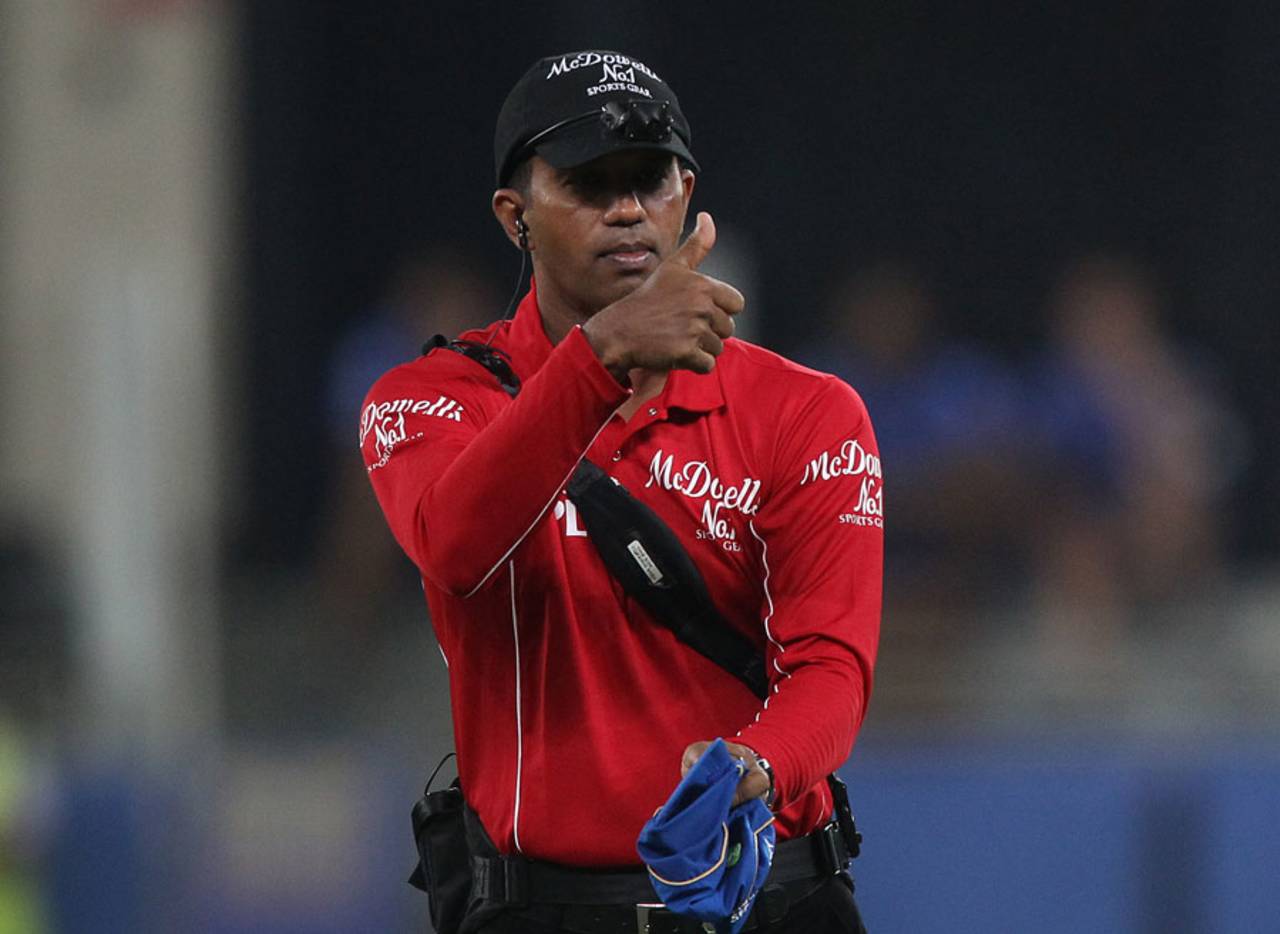Dark days ahead for the World Cup
What else could the umpiring hand signal fiasco indicate?
Andrew Hughes
Feb 21, 2015, 6:17 AM

"And this signal is a warning against texting the opposition your team-mates' weaknesses" • BCCI
Having failed to heed Wednesday's sensible advice to quit while we're ahead, the World Cup has already begun to take a turn for the worse. Dark clouds are gathering. The cricket gods have something unpleasant in mind, you can be sure, perhaps a Duckworth-Lewis miscalculation in the final, or Eoin Morgan running amok like Hercules and beating his own team-mates to death with the World Cup trophy.
You might think that this is a little unfair. Aren't we entitled to a clear warning from the cricket gods? Well no, we aren't. Immortal beings are under no obligation in this regard. Take, for instance, Law 42.12 of the Olympus regulations, which states:
a) A mortal being will contravene this Law if, in going about his business, he does or says or thinks about doing or saying anything that could possibly be considered to be insulting, disrespectful, vexing, discriminatory or platitudinous by any of the immortal gods, including the ones whose names you can never remember, their hangers-on, half-immortal offspring, Titans, nymphs, furies, harpies etcetera.
b) In the event of the contravention of this law, Zeus will inform the infringer by striking them down with a thunderbolt and/or eternal torture.
c) There is no appeal against this process.
But unlike most gods, the cricket gods do have a keen sense of irony, and on Thursday, they gave us a warning in the form of an argument about warnings. A perfectly straightforward game between Afghanistan and Bangladesh was completely overshadowed by the fact that one umpire failed to give clear hand signals.
This is clear evidence of supernatural meddling, since in the normal course of events, no self-respecting umpire is ever less than crystal clear in the matter of hand signals.
Umpires are renowned for the clarity of their hand signals. It is the reason why the rate of injuries involving cycling umpires is so low. Not only do you always know which direction a cycling umpire is about to turn, he can also explain to what the traffic situation is like on the M62, where the nearest public toilets are, and what he thinks of your attempt to overtake him at that last junction, all via the medium of hand signals.
At umpiring school, students are required to spend six months with the Royal Navy learning how to guide jet fighters onto aircraft carriers by flapping their hands and waving their arms. Following that, they are seconded to a Performing Arts college, where they master the art of mime, understanding how to convey the most complex emotions and profound thoughts with the use of a wonky finger and a raised eyebrow.
By the time he graduates, every umpire, no matter how dodgy his eyesight or shaky his grasp of the leg-before-wicket rule, is at least able to perform clear, dramatic, sweeping hand gestures, to an international standard.
Therefore, the suggestion that umpire Steve Davis was not clear in his use of the correct signal to indicate that Samiullah Shenwari had run on the pitch (the correct signal being the raising of one finger into the air, and the elongating of one leg perpendicular to the ground, mimicking an ostrich stretching out its leg after a really good nap) is simply not credible.
No, I am afraid, when we are confronted with such an example, we have to take the advice of David Hume and ask ourselves which is more likely: that an umpire has forgotten his hand signal, or that dark and sinister supernatural forces have manipulated events in order to send a warning foretelling of the imminent catastrophe that is about to engulf the cricket tournament we have been so foolishly enjoying. I think the answer is obvious.
Andrew Hughes is a writer currently based in England. @hughandrews73